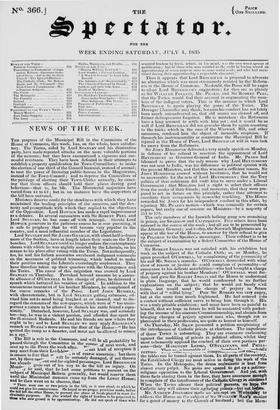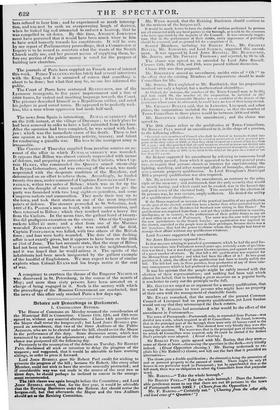NEWS OF THE WEEK.
THE progress of the Municipal Bill in the Committee of the House of Commons, this week, has, on the whole, been satisfac- tory. The Tories, aided by Lord STANLEY and his diminutive party, have made repeated attacks on the more valuable portions of the measure; but they have encountered a vigorous and suc- cessful resistance. They have been defeated in their attempts to establish a property qualification for Town-Councillors; to make the election of one third of the Council biennial, instead of annual; to vest the power of licensing public-houses in the Magistrates, instead of the Town-Council ; and to deprive the Councillors of the privilege of electing their Town-Clerks annually, by enact- ing that these officers should bold their places during good behaviour—that is, for life. The Ministerial majorities have varied from 44 to 63; but in no instance have the supporters of the bill been outvoted.
Ministers deserve credit for the steadiness with which they have maintained the leading principles of the measure, and the dex- terity and promptitude with which they replied to the objections of the Opposition. Lord Howler( has made a rapid ituprovement as a debater. In several encounters with Sir ROBERT PEEL and Lord STANLEY, he has COMO Off with triumph. Should Lord Howlett persevere in the judicious course he is now pursuing, it is safe to prophesy that he will become very popular in the country,_and a most influential member of the Legislature. Lord STANLEY and Sir JAMES GRAHAM, with about half-a-dozen more of the Section, have at length taken their seats on the Tory benches. Lord STANLEY could no longer endure the contemptuous cheers with which he was nightly assailed by the Liberals, on his return to his place after voting with the Tories. Not unfrequently, too, he and his forlorn associates overheard indignant comments on the meanness of political trimming, which tended to make their position among the Liberals exceedingly unpleasant. They have therefore taken up their quarters with the Orangemen and the Tories. The cause of this migration was avowed by Lord STANLEY on Thursday. Provoked beyond measure by a sarcas- tic allusion of O'CoN:seLe to his change of place, lie delivered a speech which betrayed his vexation of spirit. In addition to the uneourteous treatment of his brother Members, he complained of the coarse remarks of the Press. Lord JOHN RUSSELL, with characteristic, but to Lord STANLEY galling calmness, ad- vised him not to mind being laughed at or cheered, and to dis- regard the censures of the newspapers, which were of " too unim- portant a nature to be allowed to disturb his noble friend's equa- nimity." Disturbed, however, Lord STANLEY was, and seriously too—nay, he was in a violent passion, and afforded fine sport for the ill-natured Radicals. He and his friends are now where they ought to be; and to Lord STANLEY We may apply SHERIDAN S remark on BURKE'S move across the floor of the House—" He has quitted the camp as a deserter, and must not be allowed to return; as a spy."
The Bill is safe in the Commons, and will le all
passed through the Committee in the probability be f
sent up to the Peers the week after. of week, and may meet from their Lortishiw° nat kunt of reception it is reason to fear is of course uncertain; but there put, by those filet will be seriously damaged, if' not thrown sar;- Jimalready • 'ent and far-sighted personages. Lord BROUGHAM Monde-gone out of his way to do the bill an injury. On
he said, that he had some petitions to present on the Subject of Municipal Reform generally, but would reserve them until the Ministerial measure came up from the Lower House; and he then went on to observe, that
" There were one or two points in the bill, as it now stood, to which he could not give his concurrence. He hoped to see proper provision made, before the bill left the other House, to prevent the abuse of fuuds placed in trust for charitable purposes. He also wished the right of freedom to be preserved to those who now gained it by apprenticeship. He did not speak of those who acquired freedom by birth, which, in his mind, wai the very worst species of qualification ; but of those who were entitled to the uigltt by having served an apprenticeship of seven years or more to some useful tr,ele, and who had main- tained during their apprenticeship a respectable character."
Thus it appears that Lord BROUGHAM is prepared to advocate an alteration which was most strenuously resisted by the Reform- ers in the House of Cotnmons. No doubt, the Peers will be eager to adopt Lord BROUGHAM'S suggestion ; for they see as plainly as Sir WILLIAM FOLLETT, Mr. PRAED, and Sir ROBERT PEEL, that the Tories would find their account in augmenting the num- bers of the indigent voters. This is the mariner in which Lord BROUGHAM i3 again playing the game of the Tories. The Dowager Chancellor may think, because his conduct has not lately been much animadverted on, that old scores are cleared off, and former delinquencies forgotten. Ile is mistaken : the Reformers have a long account to settle with him yet ; and it would be as well if Lord BROUGHAM did not provoke them by again resorting to the tricks which in the case of the Warwick Bill, and other measures, rendered him the object of incurable suspicion. If through his instrumentality or connivance the Municipal Bill be injured in the House of Peers, Lord BROUGHAM will in vain look for mercy from the Reformers. Sir JOHN HOBHOUSE delivered a very manly speech on Monday, in defence of his refusal to sanction the appointment of Lord HEYTESBURY as Governor-General of India. Mr. PRAED had laboured to prove that the only reason why Lord HEYTESBURY was not sent to India, was his difference in political opinion with the present Ministers, and that this was not a sufficient reason. Sir JOHN HOBHOUSE avowed without hesitation, that he would not be answerable for the acts of Lord HEYTESBURY; that the Tory politics of that nobleman did unfit him to serve under a Liberal Government ; that Ministers bad a right to select their officers from the ranks of their friends; and moreover, that they were pre- pared to act in future on this principle, rather than attempt to conciliate their antagonists by unworthy truckling. The House rewarded Sir JOHN for his independent conduct in this affair, by rejecting Mr. PR AED'S motion--which was nominally for certain papers, but really one of censure on Ministers—by a majority of
254 to 179.
The only members of the Ipswich bribing gang now remaining
in prison, are SPARROW and Cm PPR RTON. Five others have been released in the course of the week ; but all are to be prosecuted by the Attorney General ; and to-day, the Norwich Magistrates are to appear at the bar of the House, to answer for their refusal to give up PILGRIM to the Speaker's messenger. Their conduct is to be the subject of examination by a Select Committee of the House of
Commons.
Sir ROBERT IreGers was not satisfied with his exhibition last week on the subject of the Catholic Oath; so, on Monday, he again provoked O'CONNELL, by complaining of the personaiity of his and Mr. SHEIL'S remarks. O'Corrilem. demanded with what show of reason or justice lie could complain of personality—of annoyance to his delicate sensibilities—who had brought a charge of perjury against his brother Members? O'CONNELL went fur- ther, and gave Sir ROBERT INGLIS and the House to understand in plain language, that he would condescend to no further explanations on the subject; that he would not bandy civil terms, but would meet the charge of perjury in future with that of " wilful lying." Poor Sir ROBERT was very angry, but at the same time much frightened. He had entered into a contest without sufficient nerve to bring him through it. His was a truly pitiable exhibition ; and must have been so painful to himself, that we hope in future he will be contented with pocket- Mg the income of his sinecure Commissionership, and abstain from bringing charges of perjury against men who, thought not so pharisaical in their professions, are quite as honest as himself. On Thursday, Mr. %law presented a petition complaining of the interference of Catholic priests at elections. The impudence of these Tories is astounding. They arc evermore exclaiming against the meddling of' priests in political affairs, whilst they most vehemently applaud the conduct of their own partisan par- sons—their HARCOURT Leeses, O'Sueetvees, and ?HILL". TI1PV OA L'A :nnattsaida nr -Unnelinivi” • ..„4,,tahr POTTSES• j the tables can be turned against them. In all parts of the country, the Established Clergy are most active in doing the work of the Tories. In the Metropolis, the drum ecclesiastic is beat from almost every pulpit. No pains are spared to get up a politico- religious opposition to the Liberal Government. And yet, with these facts staring them in the face, they have assurance enough to complain of the interference of the Catholic Clergy in elections When the Tories silence their political parsons, we hope the Catholie laity will silence their agitating priests—but not before, Mr. ANDREW JOHNSTON made an attempt on Wednesday to address the House on the subject of' Sic Wi Luau' RAB'S maim/ for a grant of money to the Church of Scotland ; but the Hem- hers refused to hear him ; and he experienced so much interrup- tion, and was met by such an overpowering laugh of derision, when he looked big and attempted to enforce a hearing, that he was compelled to sit down. By this time, ANDREW JOHNSTON must have perceived that it would have been much wiser in him to have acted honestly towards his constituents. It will be seen by our report of Parliamentary proceedings, that a Commission of Inquiry is to be issued to ascertain what the wants of the Scotch Church really are, and her present means of supplying them, be- fore any portion of the public money is voted for the purpose of building new churches.



























